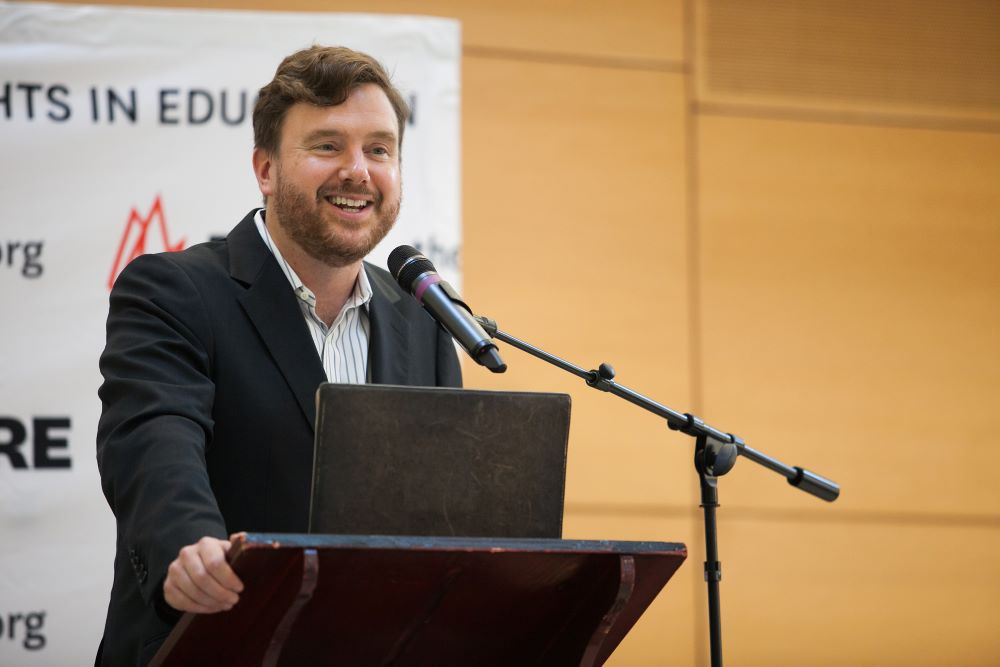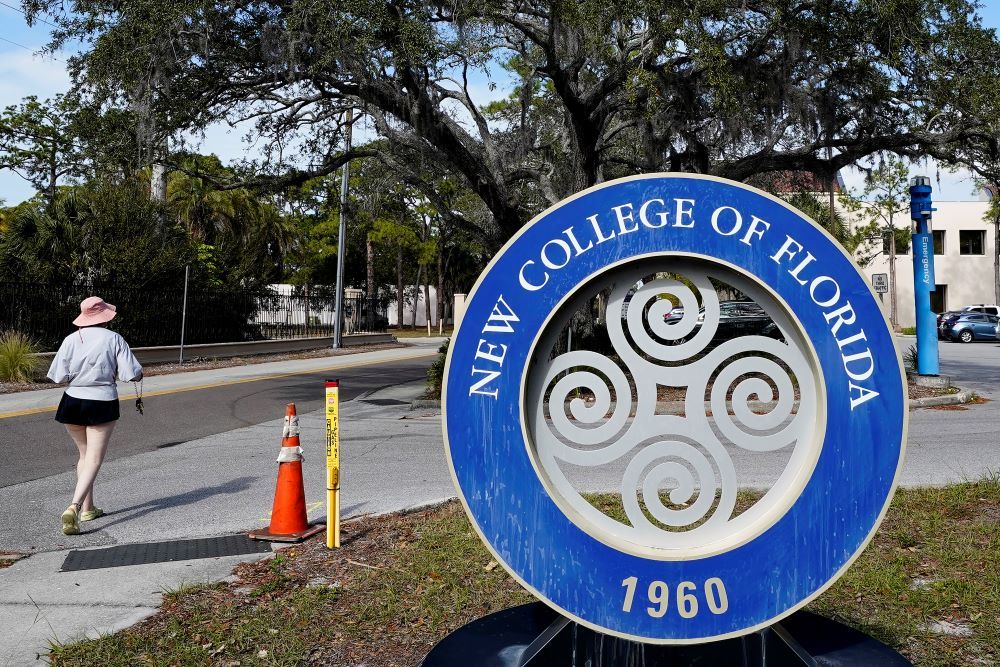
Greg Lukianoff is president of the Foundation for Individual Rights and Expression, an organization devoted to promoting civil libertarianism. He co-authored the 2015 article "The Coddling of the American Mind." (Courtesy of FIRE)
At Politico Magazine, Evan Mandery penned an interesting profile of Greg Lukianoff, president of the Foundation for Individual Rights and Expression (FIRE). The organization is devoted to the promotion of civil libertarianism. Catholics cannot embrace libertarianism of any kind but we can, perhaps, extend good wishes to the civil libertarians in this moment of time.
Some readers may be familiar with Lukianoff from the article — and later book — he co-authored with New York University psychologist Jonathan Haidt entitled "The Coddling of the American Mind." That article, published in 2015, focused on the threats to free speech posed by the changing mores of college campuses and specifically the shift from encouraging free and open debate to speech codes, "safe spaces," conformity and lack of intellectual rigor.
Lukianoff also shot the famous video of an enraged Yale University student confronting professor Nicholas Christakis because his wife had circulated an email to students suggesting they were mature enough to police their own conduct regarding Halloween costumes. Yale leaders failed to support the couple and they resigned their positions as co-masters at Silliman College. Cancel culture was born.
Not to be outdone, conservatives have also turned to canceling things with which they disagree, banning books, forbidding teachers from touching on certain topics in the classroom and peddling their own version of infantilization. The right is happy to ridicule the cultural left when it warns against microaggressions but Mandery notes that "Florida's Stop WOKE Act, championed by GOP presidential hopeful Gov. Ron DeSantis, says no student should be made to feel 'guilt, anguish, or discomfort' over historical events for which they're not directly responsible." Why is everyone fretting about children having to confront things that are challenging and uncomfortable?
Now, after the attack on the Capitol on January 6, 2021, Lukianoff thinks the threat to civil liberties from the right is more proximate: "Jan. 6 was unlike anything I expected to see in my career," he told Mandery. "I'm really scared about next year."
Why is everyone fretting about children having to confront things that are challenging and uncomfortable?
One very interesting thing in the profile is that Lukianoff, after severe bouts of depression, has turned "to cultivating what the Vietnamese monk Thich Nhat Hanh referred to as Right Thinking and Right Speech, practices rooted in mindfulness." (Regular readers will remember this beautiful tribute to the late monk from NCR's own Thomas Fox.) According to Mandery, the interplay of mindfulness with civil libertarianism found in Lukianoff's work results in "a call for humility and extending grace, at least temporarily, for the sake of clarification; for reason and due process over emotion and rushes to judgment; and an acknowledgment of the difficulty of resolving questions of fairness by situated actors."
In these polarized times, finding someone who is willing to call out both left and right demonstrates a degree of principled commitment that is praiseworthy. When Lukianoff and FIRE take on Florida's censorship laws, or requirements that employees sign DEI statements, and other illiberal activities and ideas, it is easy to side with them.
The question remains: Are Lukianoff's principles right? The answer remains "no" and the reasons are in the profile. Civil libertarianism is a good thing, until it becomes an ideology, an absolute. In Lukianoff's hands, it fits the definition of heresy attributed to Lord Acton: a truth run amok.

A student walks past the sign at New College of Florida in Sarasota, Florida, Jan. 20. The traditionally progressive public liberal arts college was taken over by allies of Gov. Ron DeSantis as part of his "war on woke." (AP/Chris O'Meara, file)
How is it good? Free speech is a necessary lifeblood of democracy. Anyone who calls themselves a liberal should think fondly on the memory of Supreme Court Justice Oliver Wendell Holmes Jr.. who did so much to shape our understanding of the First Amendment's guarantee of freedom of speech. Keeping government out of the regulation of ideas is as essential to the functioning of a democracy as counting the ballots fairly.
In an academic setting, of course, a college has a second responsibility. Not only should it teach the value of free speech to its students, but it should also help students understand that there are consequences to what they say. Speech codes and other efforts to restrain speech stem from this thoroughly decent impulse to prevent meanness, but they go too far and ignore the necessity of creating a culture that supports free speech and, importantly, encourages students to engage in civil discourse with those holding opinions opposite their own.
It should also be noted that libertarianism in the arena of First Amendment rights is not as pernicious as libertarianism in the economic realm. In the latter case, laissez faire economics leads to gross income inequality, concentrations of wealth and, therefore, power in the hands of the few, and aversion to confronting problems — the solution of which offers no profit motive — problems like climate change and reducing the number of abortions. These effects are unjust in themselves, but they also undermine democracy. It is heartening to know that Lukianoff does not extend his libertarian commitment to economics.
Advertisement
One of the deeper problems with the civil libertarianism Lukianoff promotes is its abstractness. It may be well suited to producing resilient young people, capable of arguing in ways that develop their ideas. But how do the moral claims of the common good manifest themselves in all this? For example, most liberals applauded the ACLU when it defended the right of Nazis to march in Skokie, Illinois. But what if they wanted to march in Stuttgart, Germany? Does the state there have the right to restrict speech given the uniquely horrific history of antisemitism in that country?
Another problem that evidences the persistent ideological nature of Lukianoff's approach is found when he says, "The Constitution is always what tends to save us." That is the kind of idolatry common among ideologues. Mind you, I love the U.S. Constitution as much as the next person, but it is not the text that saves us but people committed to the ideas in the text that save us. And, because we are talking about politics, the saving in question is narrow and limited. It is no less important that we all work to save democracy just because democracy does not heal everything that assails the human heart!
This profile — like so many articles published at Politico magazine — raises profound questions for our society. Libertarianism has become a kind of default position for many people and it is often preferable to the alternatives. But it is deeply flawed and, despite its fixation on freedom, it is a totalizing system that is the most dangerous. Still, whatever my disagreements with Lukianoff, I appreciate he would never try and prevent me from voicing them!







